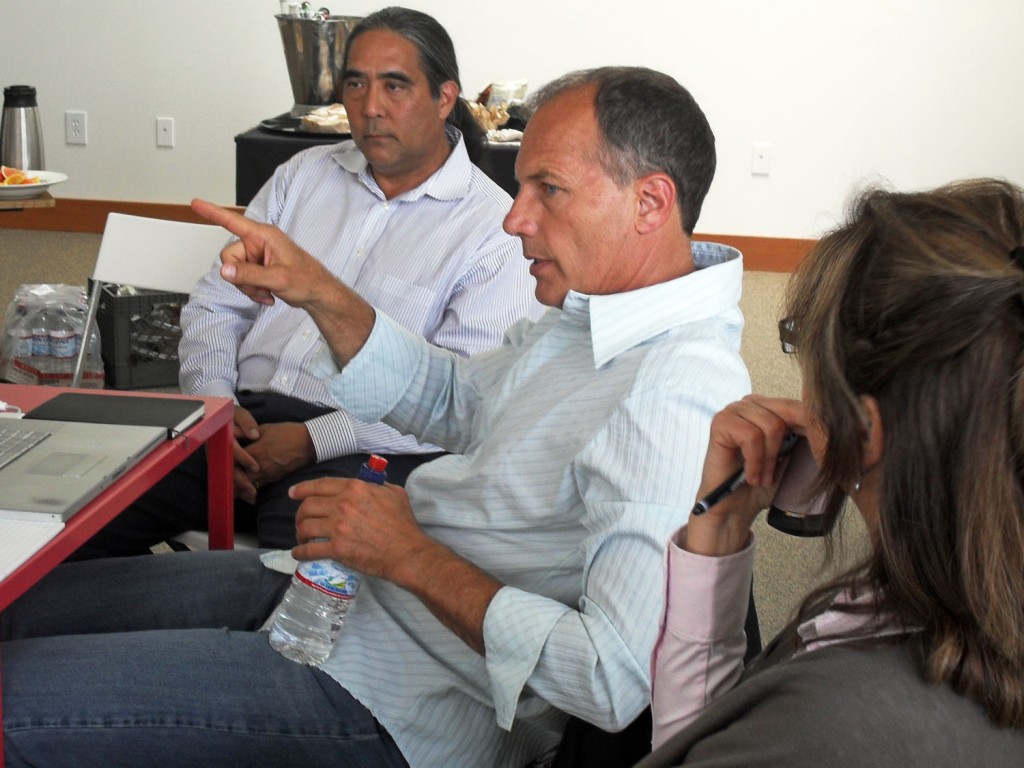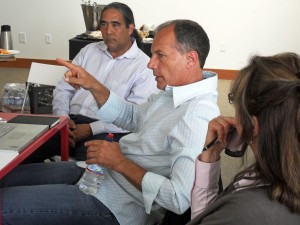
 Roots of Change funded the development of a comprehensive system dynamics mapping project that brought together 35 stakeholders representing a very wide range of interests. We facilitated stakeholder conversations to help them reach a shared understanding of how a sustainable food and agriculture system would work and what actions are required now to ensure such a system emerges by 2030. The time frame for this project was September 2010.
Roots of Change funded the development of a comprehensive system dynamics mapping project that brought together 35 stakeholders representing a very wide range of interests. We facilitated stakeholder conversations to help them reach a shared understanding of how a sustainable food and agriculture system would work and what actions are required now to ensure such a system emerges by 2030. The time frame for this project was September 2010.
System dynamics mapping is a tool for building shared understanding of a complex reality. At Roots of Change, we use it to address the complexity of both the management and transformation of the food system. We used system dynamics mapping to bring together 35 stakeholders representing a very wide range of interests and help them reach a shared understanding of how a sustainable food and agriculture system would work and what actions are required now to ensure such a system emerges by 2030.
Click to download a PDF of the complete map.
Steps Used in the Mapping Process
- Interview each of the stakeholders to clearly understand their perspectives in the overall food and agricultural system.
- Document that understanding in the form of a rigorous, systems-based representation of each of their perspectives creating a series of individual “systems maps,” and verify each map with the participant.
- Integrate those individual perspectives into a single integrated “systems map” which we use to create a shared understanding of the system as a whole.
- Design and facilitate a series of subgroups to increase the understanding of the individual members of the key issues and the system as a whole. At the same time, deepen the relationships between the individual members, the group as a whole and the Roots of Change initiatives. The Subgroups were:
- Ensuring ongoing larger scale agricultural and food systems
- Ensuring ongoing smaller scale agricultural and food systems
- Ongoing stewardship of the life systems that support our agricultural and food systems
- Ensuring equity in our agricultural and food systems
- Preliminary analysis of the map and validation by staff
- Validation with five key participants by phone and incorporation of feedback into the main map.
- Two group sessions to identify leverage points—conducted by webinar/phone conference.
- In-person strategy session to identify strategies for using the leverage points.
This collaboration resulted in a map illustrating the dynamics of the different parts of the food and agriculture system, and produced convergence in thinking regarding the leverage points that will produce the most progress toward sustainability.
Participants
- 1. AG Kawamura, Secretary, California Department of Food and Agriculture, Sacramento and Orange County
- Al Montna, President, State Board of Food and Agriculture, Monta Farms, Yuba City
- Anya Fernald, Founder, Live Culture and Eat Real Festivals, Oakland
- Cesár Hernandez, Manager, Strategic Labor Initiatives, Reiter Affiliated Companies, Oxnard
- Chukou Thao, Executive Director, National Hmong American Farmers’ Association, Fresno
- Corny Gallagher, Ag Business Executive, Bank of America Merrill Lynch, Roseville
- Daniela Simunovic, Field Organizer, Center for Race, Poverty & Environment, Fresno
- Diane Del Signore, Executive Director, Community Alliance With Family Farmers, Davis
- Edie Jessup, Program Specialist, Central California Regional Obesity Prevention Project, Fresno
- Erik Nicholson, National Vice President, United Farm Workers, Tacoma, WA
- Harold Goldstein, Ph.D., Executive Director, California Center for Public Health Advocacy, Davis
- Jan Birk, Partner, San Miguel Produce, Oxnard, CA
- Jason Peltier, Chief Deputy General Manager, Westlands Water District, Fresno
- Jennifer Hernandez, Partner, Cultivo Consulting, Covina
- Jim Poett, Owner/Operator, Poett Ranch, Santa Barbara County
- Jonathan Kaplan, Agriculture Specialist, NRDC, San Francisco
- Ken Grimes, Soil Conservationist and Community Outreach Coordinator for Small Farmers, USDA, and Technical Advisor for the African American Farmers of California, Fresno
- Kimi Watkins-Tartt, Director, Nutrition and Community Health Service, County of Alameda Department of Public Health, Oakland
- Larry Martin, Northern California Governor, Slow Food USA, and CEO, Food & Wine Trails Travel Company, Santa Rosa
- Mark Borba, CEO, Borba Farms, Fresno
- Mary-Ann Warmerdam, Director, CA Department of Pesticide Regulation, Sacramento
- Maisie Greenawalt, Vice President, Bon Appétit Management Co., Palo Alto
- Michael Dimock, President, Roots of Change, San Francisco
- Nikki Henderson, Executive Director, People’s Grocery, Oakland
- Noelle Cremers, California Farm Bureau Federation, Sacramento
- Pete Price, Legislative Director, Speaker of the California Assembly, Sacramento
- Peter Glieck, Ph.D., Founder, Pacific Institute, Berkeley
- Peter Liu, Founder, New Resource Bank, San Francisco
- Paul Muller, Owner & Operator, Full Belly Farm, Yolo County
- Richard Spezzano, President, Spezzano Consulting Service, Inc. and former Chairman of the Produce Marketing Association, Monrovia
- Steve Gliessman, Ph.D. and Clarence E. Heller, Endowed Chair for Agroecology, UC Santa Cruz, Santa Cruz
- Steve Schwartz, Executive Director, California Farmlink, Sebastopol
- Sue Sigler, Executive Director, California Association of Food Banks, Oakland
- Tom Tomich, Ph.D., UC Davis, Ag Sustainability Institute, and WK Kellogg Endowed Chair for
Sustainable Agriculture and Food Systems, Davis - Walter Robb, Co-CEO, Whole Foods Market, Oakland
The mapping process was led by R Scott Spann, MPA, and Founder of Innate Strategies. He has used similar processes to help RE-AMP find common ground on issues of plant pollution in the mid-west, and to unite stakeholders in Guatemala. His work seeks to satisfy diverse stakeholders—NGOs, government, and business leaders wishing to do the right thing in a competitive environment—in ways that benefit the whole. Scott’s experiences range from consulting with Arthur Andersen & Co. to launching the Texas office of the Nature Conservancy; serving as Managing Vice President of RPC, a small national consulting firm, to leading the Rolf Institute as Executive Director; Vice President for ARC, International, a global consulting firm specializing in leadership development and cultural change, to working for Stone Yamashita Partners, a leading branding and strategy firm.

This work is licensed under a Creative Commons Attribution-NonCommercial-NoDerivs 3.0 Unported License.
For more information on user rights of our strategic maps please email [email protected].